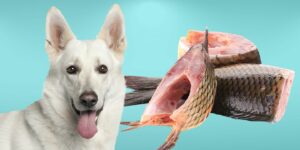The short answer is yes, dogs can eat salmon. In fact, salmon can be a healthy and nutritious option for dogs as part of a balanced diet. However, it is important to feed salmon in moderation and to be aware of any potential risks.
Introduction
Why Salmon is a popular food choice for pet owners
Salmon is a popular choice for pet owners because it is a nutrient-rich food that can provide essential nutrients to support your dog's overall health. Salmon is also an excellent source of high-quality protein and omega-3 fatty acids.
Understanding the role of fish in a dog's diet
Fish can play an important role in a dog's diet, offering an alternative protein source to traditional meats like chicken, beef, and turkey. Fish can also provide essential fatty acids and various vitamins and minerals that can benefit your dog's health.
Nutritional Components of Salmon
Protein content and its benefits for dogs
Salmon offers a high-quality protein source that can help to maintain healthy muscles, support growth, and aid in tissue repair. Dogs require a diet rich in protein to maintain their overall health and well-being.
Omega-3 fatty acids and their role in canine health
Omega-3 fatty acids are essential for dogs, as they support various aspects of their health, including:
Improving joint health
Omega-3 fatty acids can help to support joint health by providing lubrication and reducing inflammation.
Reducing inflammation
By reducing inflammation, omega-3 fatty acids can help to alleviate some symptoms associated with arthritis, allergies, and other inflammatory conditions.
Supporting cognitive function
Omega-3 fatty acids have been shown to support healthy cognitive function in dogs, particularly as they age.
Vitamins and minerals found in salmon
Salmon is a rich source of various vitamins and minerals that can benefit your dog's health, including:
Vitamin D
Important for your dog's bones, teeth, and immunity.
Vitamin B12
Essential for energy production and nervous system function.
Selenium
A trace element that can support your dog's immune system and have antioxidant properties.
Phosphorus
Important for strong bones and teeth.
When Not to Feed Salmon to Dogs
Risks associated with raw salmon
Feeding raw salmon to your dog can pose several risks, including:
Parasites
Raw salmon may contain parasites, such as flukes or tapeworms, which can be harmful to your dog's health.
Bacteria
Raw salmon can also contain harmful bacteria, like Salmonella or Listeria, potentially causing gastrointestinal issues for your dog.
Allergic reactions and sensitivities
Some dogs may be allergic or sensitive to salmon, causing symptoms like itching, vomiting, or diarrhea. Always introduce salmon gradually and monitor your dog for any signs of discomfort or distress.
Mercury content in fish
While salmon is generally low in mercury, it is still crucial to feed it in moderation to ensure your dog does not consume excessive amounts of this heavy metal.
Avoiding feeding salmon skin to dogs
Salmon skin can be high in fat and may contain harmful contaminants, so it is best to remove the skin before feeding salmon to your dog.
Safe Ways to Prepare Salmon for Dogs
Cooking methods to eliminate potential risks
To safely feed salmon to your dog, consider these cooking methods:
Baking
Baking is a simple and healthy way to cook salmon without adding extra fat or oils.
Boiling
Boiling salmon can ensure it is cooked thoroughly, reducing the risk of harmful bacteria.
Grilling
Grilling can provide a tasty, cooked salmon option for your dog with minimal added fats.
Ensuring proper portion sizes
Start by feeding small amounts of cooked salmon to your dog and gradually increase the portion size, making sure it remains a balanced part of their overall diet.
Mixing salmon with other dog-friendly foods
Consider adding small amounts of cooked salmon to your dog's regular food or mixing it with other dog-friendly ingredients like vegetables or whole grains to create a balanced and nutritious meal.
Alternatives to Salmon for Dogs
Other fish options
If your dog enjoys fish but you're looking for alternatives to salmon, consider feeding them:
Sardines
A small, nutrient-dense fish that can be a great source of omega-3 fatty acids.
Mackerel
A flavorful and oily fish with many of the same health benefits as salmon.
Whitefish
A mild-tasting option that is also a good source of omega-3 fatty acids.
Fish oil supplements for dogs
If you'd like to provide your dog with the benefits of omega-3 fatty acids without feeding them fish, consider adding fish oil supplements to their diet instead.
Frequently Asked Questions
Can dogs eat canned salmon?
Yes, dogs can eat canned salmon, but it's best to choose options without added salt and to remove any bones before feeding.
Can dogs eat smoked salmon?
It is not recommended to feed dogs smoked salmon, as the smoking process can add harmful preservatives and excessive amounts of salt.
Can dogs eat salmon bones?
Salmon bones can be a choking hazard for dogs and should always be removed before feeding.
How often should I feed my dog salmon?
Salmon should be fed in moderation and be part of a balanced diet. Consult with your veterinarian to determine the appropriate frequency for your specific dog.
Conclusion
In conclusion, dogs can safely eat salmon as part of a balanced diet. However, it is important to feed salmon in moderation and to be aware of potential risks. By following these guidelines, you can provide your dog with the nutritional benefits of salmon without exposing them to unnecessary risks. Encourage responsible feeding practices and always consult with your veterinarian if you have concerns or questions about your dog's diet.











